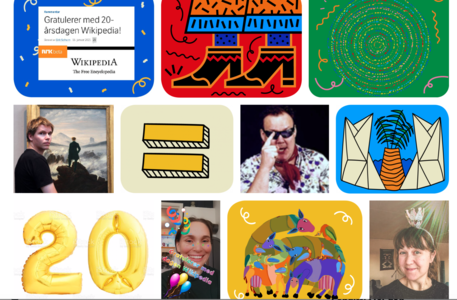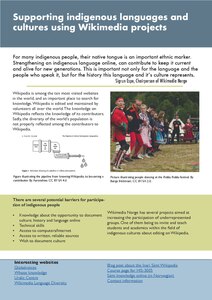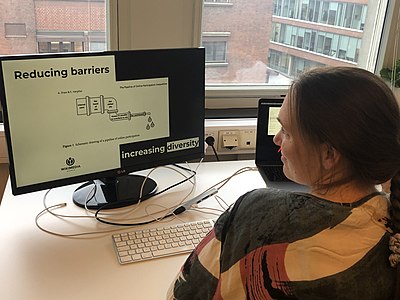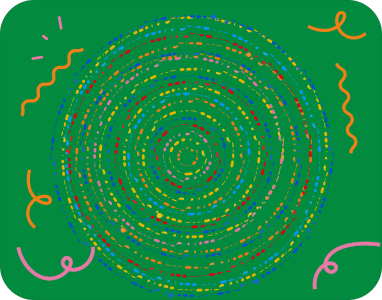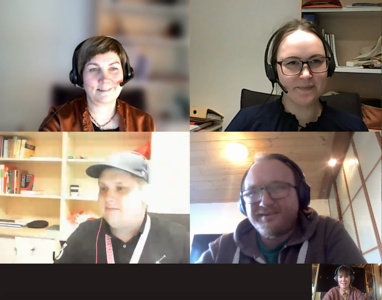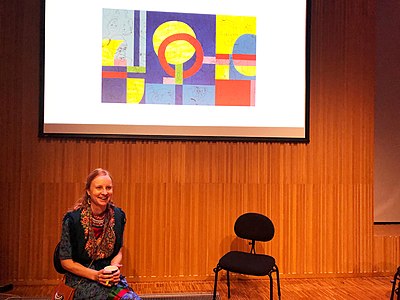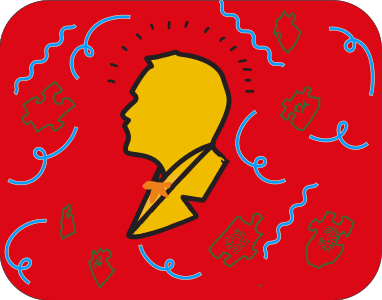Grants:APG/Proposals/2019-2020 round 2/Wikimedia Norge/Progress report form
Purpose of the report
editThis form is for organizations receiving Annual Plan Grants to report on their progress after completing the first 6 months of their grants. The time period covered in this form will be the first 6 months of each grant (e.g. 1 January - 30 June of the current year). This form includes four sections, addressing grant metrics, program stories, financial information, and compliance. Please contact APG/FDC staff if you have questions about this form, or concerns submitting it by the deadline. After submitting the form, organizations will also meet with APG staff to discuss their progress.
Metrics and results overview - all programs
edit| Participants | Newly registered | Content pages | Diversity | Volunteer hours | |
|---|---|---|---|---|---|
| Program 1 Community Support | 210 | 20 | 10,000 | 1452 | 250 |
| Program 2 Content | 150 | 60 | 27,000 | 180 | |
| Program 3 Free Knowledge | 120 | 100 | 20 | ||
| TOTAL FOR ALL PROGRAMMES | 470 | 80 | 10,100 | 28,1500 | 440 |
Explanation of grantee defined metrics:
- Diversity: Number of new or improved articles on women's biographies on the Norwegian Bokmål, Norwegian Nynorsk or Northern Sámi Wikipedias and number of Sámi-related items added to Wikidata
- Community hours: Hours community members spend on organizing activities or helping staff organize activities (not included are hours spend adding content)
Overall progress
editThe funding Wikimedia Norge is granted from Wikimedia Foundation is spent on continuing our work with volunteers, prominent partners in the Norwegian GLAM and educational sector (at the national level) and the broader civil society (at the international level), as well as with international Wikimedia affiliate partners, to increase the diversity in content and among contributors on the Wikimedia projects. We concentrate on projects and events about gender gap, for example our Women in Red project with The National Library and Oslo Metropolitan Universityas partners. The other main area of our work is indigenous languages, especially the Sámi languages spoken in Norway by the Sámi people. Building on our work and partnerships from the 2019 International Year of Indigenous Languages we are working on different collaborations and digital events to increase Sámi-related content on the Wikimedia projects. You can read more about the focus of our work on this project portal.
In this progress report we have selected 5 different projects or events under each of the three programs we report on. The three programs are:
- Supporting Communities
- Closing Content Gaps
- Raising Awareness of Free, Trusted Knowledge
We hope this selection of examples will give a good overview of our work, our partnerships and hopefully the potential of our future work and contributio to the wider Wikimedia movement.
Changes in our work due to Covid-19
The pandemic has turned our work, like in most of the world, upside down. We are assuming the 2021 will be with restrictions like the last 10 months. Hopefully there will be less restrictions when we get closer to summer, June-July. With no travels, physical meetings or events we have to find ways to continue our work both with volunteers and partners. 2021 will be a remote engagement for us.
So far, we have learned a lot about what parts of our work can be moved to digital spaces and what work is more challenging to do in digital spaces. However, this situation gives us the opportunity to upscale some projects, like our Sámi project and acquiring new skills among staff members. Our travel budget will not be used for travels but will be to develop a new membership and donation system. In 2021, we intend to upskill our efforts in communication, social media outreach and fundraising. With 2021 being the year we celebrate the 20th anniversary of Wikipedia we think is a good use of our resources to focus on the anniversary in outreach to new members and donors.
The pandemic has been a stress test for both volunteers, board members and staff members. The systems for good governance we have been working on the last 4 years is helpful guidance now that everyone works remotely. Restrictions, and social lockdown for Norway's case, is a stress factor for us all, and it’s a priority for the chair of the board of Wikimedia Norge and the Executive Director that neither volunteers nor staff members have a to heavy workload during the pandemic.
Progress programs
We are on track with our three programs. The global metrics for Newly registered and Volunteer hours are at times more challenging to track and we might not reach our goal for Newly registered. With well-established partnerships it has been possible to discuss with our partners how we still could and can proceed with our work and plans. It has been a success so far working more closely with them on communication work, for example with writing press realises and blog posts.
When we do the Wikimedia Foundation reports, we see that our three programs have grown more and more into each other. This is our goal. A GLAM project with an educational partner and maybe an international partner organisation as well is a model that works well for us. This is also a kind of project model that are welcomed among Norwegian funders. Before our next APG application we will work on finding a good way of presenting our work like it really is, as one program.
In addition to the changes mentioned above, this will be the focus of our work for the next 6 months. We will be upscaling our Sámi project. We have been granted funding from the Wikimedia Conference team for the Arctic Knot – Wikimedia Languages Conference that will take place in June 2021. We are also discussing a collaboration with both national and international partners on the upcoming Decade of Indigenous Languages 2022–2032. As part of the Global Discussions on strategy Wikimedia Norge has shared the idea of a thematic hub for minority languages. We are excited to see how this idea can be developed further the next months. All these projects will be very important for our Sámi project.
We wish we could be more involved in all the 2030 strategy discussions that are happening now. We will prioritize the discussions on hubs, as this the discussion we feel we can contribute most to and it’s where our chapter has skills we think can be useful for the implementation of the 2030 strategy.
Progress finances
Our spendings and revenues are on track. We have managed to diversify our revenues and so far in this funding year had success with applications for national funding. We will however now prioritize the planning and work on our projects and the conference the next six months and not on applying for national funding. The workload to do both is just too much for the staff members to do remotely. This is the first conference we organize, and in addition it will be a completely remote – or possibly a hybrid (remote and in person) – conference.
All of our projects now have national funding. That means that some of the staff cost covered in each project by national funding.
Evaluation of Wikikmedia Norge's work:
Every quarter, before board meeetings, staff from WMNO shares reports on wiki on our activities, spendings and communication work. This gives volunteers, members and the Wikikmedia Norge board and committees the oppourtunity to follow and oversee over work, and it's important for us to be transparent on how our resources are spent.
Guidelines for Wikimedia Norges's work:
WMNO has several guidelines for our work and the responsibility of updating them yearly, or when needed, is divided between the different board members according the what background and expertise the board members have.
Telling your program stories - all programs
editSupporting Communities
This program will strength and support the work done by and the collaborations between a diversity of communities, partner organizations and Wikimedia Norge
-
Screenshot of Wikimedia Norge's Wikipedia 20 years celebration page
Status
editThe goals we are working on to achieve for the 2019–2020 funding period are:
- WMNO will be an organization that works together with a diverse set of communities and is considered an influential organization in free culture and open knowledge.
- WMNO will offer different types of support to new and active volunteers that enables contributions to the Wikimedia projects.
- WMNO will support different community initiatives and share volunteers' stories in social media.
Our communication plan is an important tool for us to reach our goal of becoming an influential organization in free culture and open knowledge. The different communication channels we use are: Our website, wiki, blog, newsletters, Facebook, Instagram, YouTube and Twitter.
We are on track with this program and have experimented with different digital spaces for community support for meetups and events, like for example this years wikinobel using telegram. However, the number of volunteers and contributors we reach in person this this funding year will be lower , but our plan is to reach more people by upscaling our presence in social media channels.
Progress
editHere is a list of updates on projects and events from the last 6 months that summaries Wikimedia Norges’s progress so far this funding year.
Meetup for admins on Wikipedia: We are planning to organize a longer online meet-up for the administrators of the Wikipedias in Norwegian Bokmål and Norwegian Nynorsk in March. The meet-up is being made at the suggestion of contributors, and will be organized by Jon Harald (who is himself an administrator) in cooperation with a committee of volunteer administrators.
Monthly wiki meetups: Every month in 2020 (except for the summer and Christmas holidays) we have organized regular wiki meet-ups for Wikimedians. Because of the pandemic, the meet-ups have been held digitally via Google Meet starting in March. The number of participants seems to be stable at around 15–20 participants per meet-up. One bonus of holding them online is that participants from all around the country can participate, which obviously isn't the case when they are held in-person. Meet-ups are announced on-wiki, and users can subscribe to get an Echo notification when a meet-up is getting close. We have also created a calendar link that people can add to their calendar apps to be notified of new meet-ups (i.e. the two buttons at the top of w:no:Wikipedia:Wikitreff).
New solution for memberships and donations: We have signed a contract with a small Norwegian company, Solidus, to use their system for our membership registrations, memberships payments and as a donation system. This will enable us to keep track of members and communicate more regularly with them, and make sure we follow up on donors as well. So far this has been done in a rather ad hoc manner by the staff at Wikimedia Norge. In August 2020 we got a new staff member with a fundraising background, and thanks to her we have the needed expertise to improve our work on memberships and donations. Considering 2021 is the 20th anniversary of Wikipedia, we decided in October 2020 that this should be one of the things we focus on during 2021. This is also a task that is possible to do as remote work, whereas establishing new partnerships for example is more default doing remotely.
The Wikipedia Library: The Wikipedia Library is one of the best ways Wikimedia Norge has to support active contributors in their editing. The Wikipedia Library is very popular, and the contributors take turns in getting access to resources and make sure it’s not the same people that get access every time. The Wikipedia Library offers access to a Sámi newspaper, access to The National Library's normally geolocked content for IP addresses outside of Norway, and Wikimedia Norge pay for 6 accesses to Retriever. The contract with Retriever is negotiated every spring. Especially with restrictions during COVID on travel and public spaces, it’s an important resource to offer to active editors who cannot visit their local library. Retriever is mostly used to find sources for citations in Norwegian newspapers. Especially for underrepresented groups and topics, newspapers are a very important source of knowledge, because this is often knowledge or facts that have not yet “reached” academia or history books.
Highlight
Wikipedia 20 years celebration: Due to the covid restrictions, we have decided to postpone any social gathering until November 2021. We will mark the day Wikipedia in Norwegian Bokmål was launched, we will follow the COVID-19 situation and plan accordingly. Our goal is to use this entire year as a chance to tell Wikipedia’s and Wikimedia’s story, and attract more media coverage and more members and donors to Wikimedia Norge. On our web page we have made a page where volunteers, partners and friend of Wikipedia can send their congratulations and thanks to the Wikipedia community. There have been 5 newspaper articles about Wikipedia so far this year. We have been invited to talk on national radio (NRK) twice. Local contributors are expressing a sensation of a lot of positive feedback from the media in relation to the 20th anniversary.
Happy anniversary, Wikipedia! Thank you for the great work you do each year during #wikinobel – it's always great to have the Wikipedians at the Nobel Peace Center each year in October when the Nobel Peace Prize is announced.
— Kjersti Fløgstad, Executive Director of The Nobel Peace Center, on Wikimedia Norge's Wikipedia 20 years celebration page
Closing Content Gaps
This program will add high quality content to close content gaps on the Wikimedia projects by partnerships between Wikimedia Norge, volunteers and major Norwegian institutions
-
Leaflet made by Wikimedia Norge for the education program at The Arctic University of Tromsø
-
Mali K. Brødreskift from Wikimedia Norge preparing education program for The Arctic University of Tromsø
-
Wikipedia 20 years icon made by Wikmedia Norge for our Sámi project
-
Video meeting between staff at Wikimedia Norge and the president and staff members of the Sámi parliamet in Norway discussing the upcoming Decade of Indigenous Languages
Status
editThe goals of this program are:
- WMNO will explore existing national and international partnerships to diversify the content available on the Wikimedia projects.
- WMNO will support initiatives and contest that results in high quality images uploaded to Wikimedia Commons with image use across many Wikipedias.
- Through partnerships with GLAM and education institutions WMNO will give access to and contribute to free knowledge.
The three main projects in this in this program includes partnerships we have worked on for years already and they all have external funding approved for the upcoming funding period. The 3 main projects are:
We are on track with this program and by now all our projects are partly funded by national funding. Several project are moving into a phase 2 with national funding received for both the first and second phase.
Progress
editHere is a list of updates on projects and events from the last 6 months that summaries Wikimedia Norges’s progress so far this funding year.
Wiki Loves Monuments: We organized Wiki Loves Monuments (WLM) for the tenth time in 2020, using the same setup that we have used in previous years. Unfortunately only 280 photos were entered from Norway this year, the lowest number since we first organized it. We believe this can be attributed to a number of factors – the pandemic being the obvious one, but the rise of mobile (coupled with Commons' and Wikipedia's poor support for contributing via mobile) and a feeling that most monuments have already been "finished" are probably contributing factors. Because of this, we have decided not to participate in 2021, and will instead re-evaluate our participation in a few years – hopefully with some new ideas and improved tools for contributors to participate.
Women in Red: This fall was the third year we collaborated with the university OsloMet and The National Library for an education program at OsloMet, library and archive students. The students contribute to our Women in Red project as part of their university training. Their task was to make sure the 15 articles on this list were written: w:no:Wikipedia:Underprosjekter/Kvinner i rødt/Kunstnere fra Nasjonalmuseets samling. The first meeting with the students was in August and could be done in person. The Wikipedia training was done via Google Meet by Wikimedia Norge staff, as well as the evaluation meeting with the students in December. In education programs we have learned that an all Norweagian student group is easier to give a Wikipedia training to compared to an international group of students, like the one at The Arctic University of Tromsø.
We had prepared three lists of red links the students could choose from with a selection of our partners. The lists were put together by The National Museum, The Arctic University of Tromsø and The National Library. Inviting partner institutions to set up red link lists is a great and easy way of including them in this education program. The students chose to work with the list from The National Museum on female artists. Once again, we learn that working with students gives great results. They learn fast and do a great job on finding sources about less known women. The National Library also held an online workshop on how to search for sources at the library. For the fall of 2022 we have invited The Queer Archive to set up a list of red links.
Sámi place names: In the fall, we imported around 27,000 Wikidata items for places in Norway that have names in a Sámi language (or in Kven) – you can see them all, color-coordinated by language, in this Wikidata query. This was the first phase of this project, funded by Fritt ord and done in cooperation with the Norwegian Mapping Authority. The second phase, taking place in the first quarter of 2021, will see these names added as Wikidata lexemes as well. Sámi languages have several grammatical cases, so adding the names as lexemes will make it possible to programmatically generate correct sentences using these names in Sámi languages. The second phase will be done in cooperation with the University of Tromsø, the National Library of Norway and the Sámi Parliament of Norway. Blog post about the project (in Norwegian)
Decolonization of image collection: Together with The Sámi Archive and The National Archive, funded by The Arts Council, we are working on digitizing an image collection of the Reindeer Pastures Commission of 1913. This commission conducted negotiations between Norway, Sweden and Finland to clarify the Sámi people's right to let their reindeer herds graze in the neighboring country. The collection includes 1300 photos.
We are currently waiting for the bot for uploading to Wikimedia Commons to be approved. The Sámi Archives have worked on finding more information about a selection of the images. This information we will use when we share the images in a social media campaign. These texts are translated to Northern Sámi. The project page has also been translated to Northern Sámi. We have also agreed with The Sámi Archives to collaborate on a blog post about archive collections on indigenous knowledge and history. During the project we had several ethical discussions on digitization of indigenous history. This is well described in the declaration with the title Challenging and Decolonising the Archive.
During the project the archives discovered more material from the Reindeer pastures Commission of 1913, and we have applied for funding from The Arts Council for a second phase of this project, together with the National Archives and the Sámi Archives. A press release about this collaboration was sent out during the Sámi language week, Giellavakkhu, in October 2020.
Highlight
Education program at The Arctic University of Tromsø: On 2 October 2020, we got the chance to give a Wikipedia editing class for the course History of Indigenous peoples, Indigenous people, ethnic minorities and the multi-cultural society in the north at The Arctic University of Tromsø. The course comprises theoretical and empirical aspects related to the history of indigenous peoples. The empirical focus is on the history of the Sámi peoples from the Middle Ages to the political revival of indigenous peoples during the later part of the 20th century. The course also looks at multi-cultural societies in North-Western Europe and aspects in connection with the relation between majority/minority and nation. The history of the Sami is compared with the history of colonialism and the revival of some indigenous societies around the world. The course consisted of 18 students from all over the world. Due to current restrictions they were all studying remotely. The project page can be found here. The aim of teaching this course was to sow some seeds on how powerful the Wikimedia platforms can be to increase the general knowledge on these topics. We wanted the students to get some tools to support indigenous cultures while studying, through knowing and understanding how Wikipedia and the other projects work. We touched topics on how to improve existing articles on Wikipedia by adding more sources and using a more neutral language, how to add new articles and translate articles for other language versions.
To create a common ground of basic skills on Wikipedia, we prepared some instruction videos for them to create a profile, write something on their profile and sign up on the Wikimedia Dashboard. We found that they all watched the videos and did the preparations, which was a good starting point for the course. We experienced that the students struggled to grasp why editing Wikipedia was relevant for them in their current situation; they were several times asking if this was something they needed for the exams. However, through the course we saw they became aware of lack of good information about indigenous themes on their language versions, and there were good debates on the importance of respect to the different culture regarding selecting information to publish online.
This project was funded by the Sámi Parliament of Norway. There is interest at the Univeristy of Tromsø to keep offering Wikipedia editing courses to their students, but maybe at the end of their master courses rather than the beginning. We also see that teaching Wikipedia editing to a group of students that work on 12 different language versions is challenging, especially so online. So for future courses we will focus more on working with sources, Wikidata or Wikimedia Commons, that are common across all languages.
I think it would be a great idea if all the lectures working at the master program of Studies of Indigenous People got the opportunity to get information about using Wikipedia as a tool in the education. They could contribute and encourage students to edit across several disciplines.
— Petia Mankova, Associate Professor at the Department of Archaeology History Religious Studies and Theology at UiT The Arctic University of Norway
Raising Awareness of Free, Trusted Knowledge
This program will rise awareness of whose knowledge is shared on the Wikimedia projects and welcome new voices to contribute
-
Wikimedia Norge's event during the 2020 Sámi Márkomeannu festival
-
Wikipedia 20 years icon made by Wikmedia Norge for wikinobel
-
Status
editThe goals of this program are:
- Norway has a national online encyclopedia, by some viewed as a competitor to Wikipedia, and WMNO will raise awareness on how Wikipedia works and is part of an international ecosystem of knowledge.
- WMNO will continue to build strong partnerships with a select group of partners that share our vision of free knowledge.
- By participating in major national events in Norway, WMNO will advocate for diversity on Wikimedia projects and beyond.
We are on track with this program. The Acric Knot conference in June will be the main focus of this program the next 6 months.
Progress
editHere is a list of updates on projects and events from the last 6 months that summaries Wikimedia Norges’s progress so far this funding year.
Wikinobel: Wikinobel is one of the recurring annual events we hold in-person, but it was organized online in 2020, with the main coordination activity centered on Telegram. It is always exciting to follow the announcement live, and try to organize the fact-finding and follow the progress of updates in various language editions. How much work needs to be done at each event obviously depends on who the laureate is – 2020's laureate, the World Food Programme, is a well-known UN organization, and was already covered in most major language Wikipedias, so this year's Wikinobel event didn't have as much impact as it has had in previous years in terms of edits. By doing the event online via Google Meet and Telegram the participants were an interrnational group of contibutors and other interested in the topic. One staff member from Wikimedia Norge also took part at a live session on the facebook page of Wikipedia Weekly.
Sámi music festival Márkomeannu 2020: In the past 2 years, Wikimedia Norge has taken part at the Sámi culture festival Márkomeannu in July. This year, the festival was of course cancelled. However, the festival did organize a one-day festival in October, and Wikimedia Norge was invited to be part of the program. Together with the people behind the podcast In the footsteps of Elsa Laula through Sápmi - 100 years of Sámi fight for rights, we held an event at the library in the city of Bodø in the north of Norway. During the event, an episode from the podcast was played and followed by a debate on how for example a project like Wikipedia can be used by underrepresented groups in society to become more visible. It’s the second time we do an event with this podcast collective.
This was the only in-person event we could do this past 6 months. We are glad we got an opportunity to continue our collaboration with the people behind the Márkomeannu festival even during the pandemic. All our costs for the event were covered by funding the Márkomeannu festival which was awarded by the Fritt Ord Foundation.
Sámi Language week, Giellavakkhu, 2020: For the past two years, the Sámi Language week, Giellavakkhu, has been initiated and promoted by The Sámi parliament of Norway, first during the 2019 UNESCO International Year of Indigenous Languages. The goal of the Sámi language week is to raise the status of the Sámi languages, and to increase knowledge of Sámi languages and culture throughout society. Private and public institutions, businesses, organizations and other actors are encouraged to make Sámi languages visible. The aim is to take on a responsibility for the Sámi languages being heard, spoken and used in all areas of society.
This year, the Giellevakkhu took place in October 2020, and Wikimedia Norge focused on press and communication work since no physical events could take place due to COVID. In partnership with The National Library a press release was sent out by them during Giellevakkhu on our collaboration on Sámi place names. Press release from the National Library of Norway. In partnership with The National Archives and the Sámi Archive, a press release was sent out them during Giellevakkhu on our collaboration project on the decolonization of the Reindeer Pastures Commission of 1913. Press release from the National Archives. We also shared a blog post about the Inari Sámi Wikipedia project on the Diff blog and in our social media channels.
Queer Cultural Year 2022: In 2022 it will have been 50 years since the legalization of sexual intercourse between men in Norway. The National Museum, the National Library and Skeivt Arkiv (Queer Archive) has agreed to name 2022 the year of Queer Culture. This occasion will be used to put focus on queer culture, art and history all over Norway. In a collaboration with Skeivt Arkiv, Wikimedia Norge aims to upload queer culture statements as posters and leaflets to Wikimedia Commons. We have applied for funding from the Fritt Ord Foundation for this project.
Highlight
From the Incubator to the World – Inari Sámi Wikipedia: In 2020, we saw another Sámi language join the Wikipedia family. Inari Sámi is a small language, spoken only in one geographical region in Finland. The language has experienced a successful revitalization, and sees a growing number of young people using it. The motivation for building a Wikipedia community in Inari Sámi is to give the school children a chance to find information in their own language. It is very inspirational to see such a positive development in a previously endangered language, and it motivates us in our daily work with increasing content of indigenous languages, culture and history. Wikimedia Norge staff member have offered to help in technical issuse on the Inari Sámi Wikipedia and are doing so in collaboration with the editors on Inari Sámi Wikipedia.
For many indigenous people, their native tongue is an important ethnic marker. Strengthening an indigenous language online, can contribute to keep it current and alive for new generations. This is important not only for the language and the people who speak it, but for the history this language and it’s culture represents.
— Sigrun Espe, Chairperson of Wikimedia Norge, in blog post on Diff, From the Incubator to the World – Congratulations Inari Sámi Wikipedia
Revenues received during this six-month period
editPlease use the exchange rate in your APG proposal.
- Important note
- the anticipated column may list revenues anticipated for the whole year instead of only the 6 months. Please make sure that this the time period clear in the table.
- In the explanation column, always mention relevant information about the numbers: what period they refer to etc.
Please use the exchange rate in your APG proposal: Exchange rate =0,1101 USD
Table 2 Please report all spending in the currency of your grant unless US$ is requested.
- Please also include any in-kind contributions or resources that you have received in this revenues table. This might include donated office space, services, prizes, food, etc. If you are to provide a monetary equivalent (e.g. $500 for food from Organization X for service Y), please include it in this table. Otherwise, please highlight the contribution, as well as the name of the partner, in the notes section.
Revenue source Currency Anticipated Q1 Q2 Q3 Q4 Cumulative Anticipated ($US)* Cumulative ($US)* Explanation of variances from plan External funding NOK 781,000 69,828 273,371 343,199 85,988 37,786 278,000 NOK in funding are included in the accounting for projects under program 1, 2 and 3. Inkind donations NOK 300,000 50,000 70,000 120,000 33,030 13,212 Due to covid and no physival events the amount of inkind donations are lower APG from Wikimedia Foundation NOK 1,970,000 492,501 492,501 985,002 216,897 108,449 TOTAL NOK 3,051,000 612,329 835,872 1,448,201 335,915 159,447
* Provide estimates in US Dollars
Spending during this six-month period
editPlease use the exchange rate in your APG proposal.
- Important note
- Budget can be the budget for the whole year (and thus the percentage will reflect the half year and should be around 50%, or the half year, in which case the % should be around 100%. Please make that clear in the table.
- In the explanation column, always mention relevant information about the numbers: what period they refer to.
Table 3 Please report all spending in the currency of your grant unless US$ is requested.
- (The "budgeted" amount is the total planned for the year as submitted in your proposal form or your revised plan, and the "cumulative" column refers to the total spent to date this year. The "percentage spent to date" is the ratio of the cumulative amount spent over the budgeted amount.)
Expense Currency Budgeted Q1 Q2 Q3 Q4 Cumulative Budgeted ($US)* Cumulative ($US)* Percentage spent to date Explanation of variances from plan Staff expenses Staff expenses Program 1 Supporting communities NOK 540,000 114,479 94,841 209,320 59,454 23,046 39 % Staff expenses for projects are partly covered by national project funding Staff expenses Program 2 Closing content gaps NOK 540,000 114,479 94,841 209,320 59,454 23,046 39 % Staff expenses for projects are partly covered by national project funding Staff expenses Program 3 Raising awareness of free, trusted knowledge NOK 270,000 57,240 47,421 104,661 29,727 11,523 39 % Staff expenses for projects are partly covered by national project funding Staff expenses Operations NOK 450,000 95,396 79,034 174,430 49,545 19,205 39 % Operations expenses Office costs, audit & accountancy, travel costs staff & board members NOK 739,000 34,402 126,324 160,726 81,364 17,696 23 % Some of these costs are covered by national funding Program expenses In our 3 programs we had several national funding applications accepted, so we have higher spendings also Program 1 Supporting communities NOK 200,000 31,441 106,745 138,186 22,020 15,214 69 % Program 2 Closing content gaps NOK 200,000 31,441 106,745 138,186 22,020 15,214 69 % Program 3 Raising awareness of free, trusted knowledge NOK 100,000 15,721 53,373 69,094 11,010 7,607 69 % TOTAL NOK 3,039,000 494,599 709,324 1,203,923 335,915 132,552 40 %
* Provide estimates in US Dollars
Compliance
editIs your organization compliant with the terms outlined in the grant agreement?
editAs required in the grant agreement, please report any deviations from your grant proposal here. Note that, among other things, any changes must be consistent with our WMF mission, must be for charitable purposes as defined in the grant agreement, and must otherwise comply with the grant agreement.
Are you in compliance with all applicable laws and regulations as outlined in the grant agreement? Please answer "Yes" or "No".
- Yes
Are you in compliance with provisions of the United States Internal Revenue Code (“Code”), and with relevant tax laws and regulations restricting the use of the Grant funds as outlined in the grant agreement? Please answer "Yes" or "No".
Yes
Signature
edit- Once complete, please sign below with the usual four tildes.
- Astrid Carlsen (WMNO) (talk) 15:28, 29 January 2021 (UTC)
Resources
editResources to plan for measurement
edit- Global metrics are an important starting point for grantees when it comes to measuring programmatic impact (Learning Patterns and Tutorial) but don’t stop there.
- Logic Models provide a framework for mapping your pathway to impact through the cause and effect chain from inputs to outputs to outcomes. Develop a logic model to map out your theory of change and determine the metrics and measures for your programs.
- Importantly, both qualitative and quantitative measures are important so consider both as you determine measures for your evaluation and be sure to ask the right questions to be sure to capture your program stories.
Resources for storytelling
edit- WMF storytelling series and toolkit (DRAFT)
- Online workshop on Storytelling. By Frameworks institute
- The origin of storytelling
- Story frames, with a focus on news-worthiness.
- Reading guide: Storytelling and Social change. By Working Narratives
- The uses of the story.
- Case studies.
- Blog: 3 Tips on telling stories that move people to action. By Paul VanDeCarr (Working Narratives), on Philanthropy.com
- Building bridges using narrative techniques. By Sparknow.net
- Differences between a report and a story
- Question guides and exercises.
- Guide: Tools for Knowledge and Learning. By Overseas Development Institute (UK).
- Developing a strategy
- Collaboration mechanisms
- Knowledge sharing and learning
- Capturing and storing knowledge.
